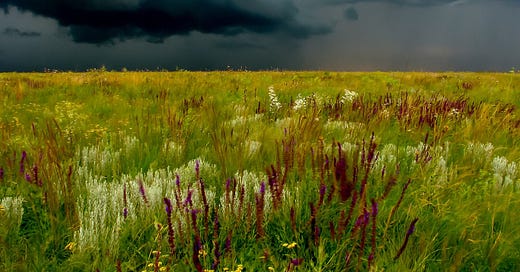Because my reading follows a set and recurring pattern, there are some literary niches I end up exploring with unusual, maybe even weird thoroughness. One of these is the “summer place” book. One of the weeks of my prayer cycle, which governs my reading, is dedicated to the summer between high school and college; in that week, I try to read something set in “that summer,” or “the summer place.” The summer place is the place we go back to every summer, where we make discoveries and reckon with losses. Previous entries in the “summer place” genre have included Jenny Erpenbeck’s Visitation, and the grand high matriarch of summer books, Tove Jansson’s (wait for it) The Summer Book.
These books tend to be lyrical, shadowed by aging and death, and (Jansson’s an exception here) intensely aware of history. The summer place is abandoned in the war years, it changes hands with economic shifts, it’s bombed or turned into a hospital and maybe restored, maybe not. Brideshead Revisited has some of the aspects of a summer-place book, now that I’m thinking of it.
This time around, I read Andreï Makine’s Dreams of My Russian Summers, in the Strachan translation, and tbh it rivals Jansson as the ultimate summer-place book. Makine was born in the Soviet Union in the 1950s and sought political asylum in France in the late ’80s. Dreams is an autobiographical novel shaped by the relationship between a young Russian and his French grandmother. (Wait, this relationship with the grandmother is another resonance with The Summer Book. Huh.) Through the belle epoque memories and hand-me-down stories of the grandmother, the boy creates an imagined France: a place of bare shoulders and jeweled hairdos, imperial pomp and democratic self-assertions, love affairs and cafes. Everything that’s absent from the grandmother’s village on the edge of the steppe, and the boy’s industrial town on the Volga.
This book captivated me from the opening pages, the description of the smiles of women in a photo album. Take a look and see how you like these pages—the attentiveness to class difference, and yet also the honeyed lyricism, the longing for a never-experienced past. The boy’s perusal of the photos is interrupted twice: first by a photo of a woman who seems totally unlike all the others, totally out of place, and then by the coupling of two hawkmoths, which he mistakes, at first, for one big misshapen creature. Those themes of sex, loss, mystery, and misunderstanding will carry through the novel and give it shape.
For me the childhood chapters were the most haunting and unexpected. As the boy grows into a teen and then a man, his perceptions coarsen, which is a striking literary effect but you lose some of the delight and strangeness of the earlier chapters. This is also a book you’ll only like if you not only have patience for, but are genuinely interested in, how people make ideas of place and culture into homes. “French” and “Russian” are reified here, contrasted, uneasily inhabited or desired. People like being stereotypes! And yet that very desire to become one’s national costume always makes it obvious when the costume doesn’t fit. Anyway, so there are the classic Russian figures—the benevolent village drunk, the shy peasant with a deep imagination—unchanged against the huge landscape of the steppe, no matter what happens in Moscow. And there are French types as well, though they seem a bit more vulnerable to politics; it’s not clear that the panache endures to the end of the Cold War.
In the last quarter or so, this short book slows down and even drags a bit. But it rises again at the close, which takes us back to that photo album. The secrets of its lost world are not quite lost; it turns out that the past was working silently within the present, unknown, maybe sensed, but never acknowledged.
Commonplace Book
There is a disease in him who despiseth present mercies, which till it be cured, he can never be happy. He esteemeth nothing that he hath, but is ever gaping after more: which when he hath, he despiseth in like manner. Insatiableness is good, but not ingratitude.
—Thomas Traherne, (c.1637-1674), poet and author of “Centuries of Meditations”… via his Twitter account. I’d love to commission Becca Rothfeld to write an essay on that last line.
Links Losers Like
“Welcome to Smithsonian Open Access, where you can download, share, and reuse millions of the Smithsonian’s images—right now, without asking. With new platforms and tools, you have easier access to more than 4.9 million 2D and 3D digital items from our collections—with many more to come. This includes images and data from across the Smithsonian’s 21 museums, nine research centers, libraries, archives, and the National Zoo.” Scroll around and see what you discover.
Now Playing
Whiskey Shivers, “Graves”
Photo of a summer thunderstorm over the Ukrainian steppe by NativePlanting, via Wikimedia Commons and used under a Creative Commons license.



The mention of the prayer cycle and it governing your reading is tantalising, as is the notion of a week of the cycle being "dedicated to the summer between high school and college". Obviously this may be getting into private stuff so no pressure at all, but I find this really interesting and would love to hear more about it.